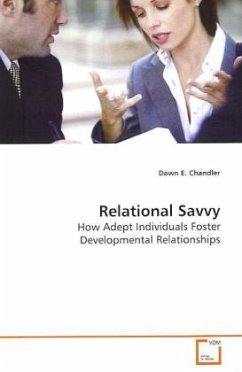This book explores why some individuals are more
adept with developmental relationships. The grounded
theory study on which the book is based found that
Relationally Savvy individuals, those who are
skillful at initiating and
cultivating developmental relationships, have four
common characteristics: Developmental Proactivity;
Managing Interactions; Enabling Relational Attitudes;
and Outstanding Social Skills. The book describes the
empirical study and
each of these "ingredients" necessary to foster rich,
high-quality developmental relationships. It outlines
implications for individuals and organizations. For
individuals, the book highlights the need to consider
their relative Savvy and its impact on their ability
to enlist others in their development. For
organizations, it suggests the need to complement
formal mentoring program efforts with training
designed to enhance employees' Savvy.
adept with developmental relationships. The grounded
theory study on which the book is based found that
Relationally Savvy individuals, those who are
skillful at initiating and
cultivating developmental relationships, have four
common characteristics: Developmental Proactivity;
Managing Interactions; Enabling Relational Attitudes;
and Outstanding Social Skills. The book describes the
empirical study and
each of these "ingredients" necessary to foster rich,
high-quality developmental relationships. It outlines
implications for individuals and organizations. For
individuals, the book highlights the need to consider
their relative Savvy and its impact on their ability
to enlist others in their development. For
organizations, it suggests the need to complement
formal mentoring program efforts with training
designed to enhance employees' Savvy.








